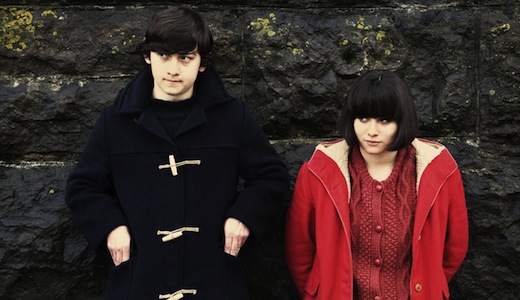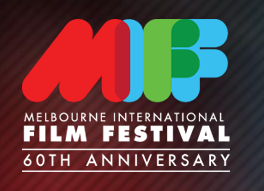 As the 60th Melbourne International Film Festival reaches the end of its first full week, a chill came through the streets of the Melbourne CBD and not just because it is winter and always damn cold in the rainy city. Richard Gray from The Reel Bits blew into town, and Melbourne breathed a sigh of indifference. Meanwhile, at the Festival, the Cannes 2011 Grand Prix winner The Kid with a Bike made its debut in Australia, and crowds flocked to sold-out sessions of Richard Ayoade’s Submarine, Lena Dunham’s Tiny Furniture, The Solitude of Prime Numbers, Winter’s Daughter and the very local Persecution Blues: The Battle for the Tote. Meanwhile, somewhere in Cinema 3 of Greater Union on Russell Street, someone was being exposed to Sion Sono via Cold Fish for the first time. If anybody has footage of this person, we will publish it. That’s a promise.
As the 60th Melbourne International Film Festival reaches the end of its first full week, a chill came through the streets of the Melbourne CBD and not just because it is winter and always damn cold in the rainy city. Richard Gray from The Reel Bits blew into town, and Melbourne breathed a sigh of indifference. Meanwhile, at the Festival, the Cannes 2011 Grand Prix winner The Kid with a Bike made its debut in Australia, and crowds flocked to sold-out sessions of Richard Ayoade’s Submarine, Lena Dunham’s Tiny Furniture, The Solitude of Prime Numbers, Winter’s Daughter and the very local Persecution Blues: The Battle for the Tote. Meanwhile, somewhere in Cinema 3 of Greater Union on Russell Street, someone was being exposed to Sion Sono via Cold Fish for the first time. If anybody has footage of this person, we will publish it. That’s a promise.
Tiny Furniture
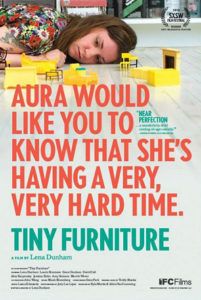 The mumblecore genre has produced films such as LOL and Cyrus over the last few years, and is incredibly steeped in its own place and time. Aimed at giving middle-class white kids in their early twenties a voice, because they have naturally been shockingly underrepresented in society, the movement typically focuses on relationships and conversations rather than actual plot points or narrative. It’s a tiny bit ironic then that this film won the Jury Prize for Best Narrative Feature at South By Southwest last year. Focusing on Aura (Lena Dunham), a recent college graduate who moves home to an unwelcoming family and finds herself involved with two selfish men. Casting herself in the lead, and using her own mother and sister to play their respective roles, writer/director Dunham’s casting choices are indicative of how self-reflective and insular this film can often be. Bordering on a parody of the whole New York’s Tribeca scene (and parallel scenes around the world), Tiny Furniture is a bit like reading somebody else’s diary: it is often intimate, and occasionally hilarious in its observations, but we are ultimately left wondering why we should care. There is nobody in the film to really like, and virtually everybody makes annoying decisions and commentary. The core audience is undoubtedly the very people it is mocking, who will go back out into the streets and discuss the pains of editing a French lifestyle website to their equally shallow friends. While Tiny Furniture will undoubtedly be hailed as a triumph in the observation of women, it is no more insightful than the Twitter stream of a hipster.
The mumblecore genre has produced films such as LOL and Cyrus over the last few years, and is incredibly steeped in its own place and time. Aimed at giving middle-class white kids in their early twenties a voice, because they have naturally been shockingly underrepresented in society, the movement typically focuses on relationships and conversations rather than actual plot points or narrative. It’s a tiny bit ironic then that this film won the Jury Prize for Best Narrative Feature at South By Southwest last year. Focusing on Aura (Lena Dunham), a recent college graduate who moves home to an unwelcoming family and finds herself involved with two selfish men. Casting herself in the lead, and using her own mother and sister to play their respective roles, writer/director Dunham’s casting choices are indicative of how self-reflective and insular this film can often be. Bordering on a parody of the whole New York’s Tribeca scene (and parallel scenes around the world), Tiny Furniture is a bit like reading somebody else’s diary: it is often intimate, and occasionally hilarious in its observations, but we are ultimately left wondering why we should care. There is nobody in the film to really like, and virtually everybody makes annoying decisions and commentary. The core audience is undoubtedly the very people it is mocking, who will go back out into the streets and discuss the pains of editing a French lifestyle website to their equally shallow friends. While Tiny Furniture will undoubtedly be hailed as a triumph in the observation of women, it is no more insightful than the Twitter stream of a hipster.
[stextbox id=”custom” caption=”The Reel Bits”]A dry observation of early-20s middle-class life from one of their own. True to life this may be, and while it is occasionally disarmingly funny, it is not the stuff of great cinema. Dunham’s next project, the Judd Apatow produced Girls, may be more suited to her stylings. [/stextbox]
Tiny Furniture does not currently have a release date in Australia.
Cold Fish
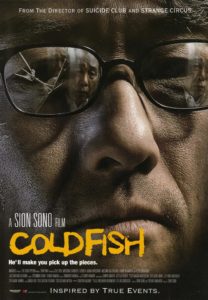 For international audiences, Cold Fish is cult Japanese director Sion Sono’s follow-up to the mammoth four-hour Love Exposure, which played at MIFF in 2009. With Cold Fish, Sono builds upon the insanity and spontaneity, brilliance and originality he displayed in his previous films. A spiral of destruction eventuates from Shamoto (Mitsuru Fukikoshi, rejoining Sono after Love Exposure), a bullied tropical fish store owner, being drawn into the web of a psychotic couple: the shady business man Murata (Denden) and his wife. Incredibly gory, and in large parts brutally misogynistic, Sono’s visual sense grows in leaps and bounds, from the very rough look of earlier works like Suicide Club and the crisp but raw video look of Love Exposure. Shinya Kimura’s photography is often stunning, from the cool blues of the aquariums to the bright reds of the murders in the film.
For international audiences, Cold Fish is cult Japanese director Sion Sono’s follow-up to the mammoth four-hour Love Exposure, which played at MIFF in 2009. With Cold Fish, Sono builds upon the insanity and spontaneity, brilliance and originality he displayed in his previous films. A spiral of destruction eventuates from Shamoto (Mitsuru Fukikoshi, rejoining Sono after Love Exposure), a bullied tropical fish store owner, being drawn into the web of a psychotic couple: the shady business man Murata (Denden) and his wife. Incredibly gory, and in large parts brutally misogynistic, Sono’s visual sense grows in leaps and bounds, from the very rough look of earlier works like Suicide Club and the crisp but raw video look of Love Exposure. Shinya Kimura’s photography is often stunning, from the cool blues of the aquariums to the bright reds of the murders in the film.
Cold Fish is, like everything from the avant garde poet turned filmmaker, designed to provoke and to shock, although the violence – and in particular the violence against women – is hard to reconcile within the confines of the narrative. Indeed, many viewers will not get past this, and perhaps this will be the biggest barrier to finding the visual and emotional strengths of the film. Darkly comic and brutal in equal measure, Cold Fish is a film that will linger long with you after it has finished. Perhaps the most shocking thing about the film is that it is based on a true story.
[stextbox id=”custom” caption=”The Reel Bits”]You would have to be a Cold Fish indeed to not feel something for this film. Undeniably divisive, edgy and pushing the boundaries of taste, Sono has managed to create another beautiful masterpiece out of the ugly harshness of reality.[/stextbox]
Cold Fish does not currently have a released date in Australia
Submarine
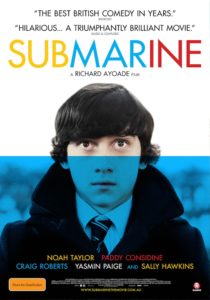 Submarine‘s writer and director Richard Ayoade is perhaps best known for his role as Moss in The IT Crowd, along with his appearances in cult comedies The Mighty Boosh and Garth Marenghi’s Darkplace. Yet as readers of his monthly Total Film columns will know, Ayoade is a lover of film and understands its construction on a cellular level. This love is evident in his debut feature directorial effort, an adaptation of the novel of the same name by Joe Dunthorne. Set during the 1980s in Swansea, the deluded 15-year-old Oliver Tate (Craig Roberts, Jane Eyre) falls for classmate Jordana (Yasmin Paige, The Sarah Jane Adventures) amidst a sea of troubles at home. His depressed father (Noah Taylor, Red Dog) and frustrated mother (the ubiquitous Sally Hawkins, Never Let Me Go) experience further problems with the arrival of her ex-boyfriend, a new-age guru (Paddy Considine, Le Donk & Scor-zay-zee). Submarine is a pitch-perfect “coming of age” story, told through the pretentious adult voice of Roberts, although much of Ayoade’s and Dunthorne’s voice is undoubtedly there. Seasoned actors like Considine get to have a bit of fun with their caricatures, but the performances from all of the young leads are amazing, bringing an authenticity to the young characters that other high-school dramas can only dream of. Oliver’s filtered “Super 8mm” memories exaggerate everything, signalling some influence from the earlier works of Woody Allen (his picture graces Oliver’s wall), and in particular the flashback sequences in Annie Hall. Shades of Harold & Maude pervade this darkly comic drama, although it comes with a style all of its own. Ayoade’s film is an instant classic.
Submarine‘s writer and director Richard Ayoade is perhaps best known for his role as Moss in The IT Crowd, along with his appearances in cult comedies The Mighty Boosh and Garth Marenghi’s Darkplace. Yet as readers of his monthly Total Film columns will know, Ayoade is a lover of film and understands its construction on a cellular level. This love is evident in his debut feature directorial effort, an adaptation of the novel of the same name by Joe Dunthorne. Set during the 1980s in Swansea, the deluded 15-year-old Oliver Tate (Craig Roberts, Jane Eyre) falls for classmate Jordana (Yasmin Paige, The Sarah Jane Adventures) amidst a sea of troubles at home. His depressed father (Noah Taylor, Red Dog) and frustrated mother (the ubiquitous Sally Hawkins, Never Let Me Go) experience further problems with the arrival of her ex-boyfriend, a new-age guru (Paddy Considine, Le Donk & Scor-zay-zee). Submarine is a pitch-perfect “coming of age” story, told through the pretentious adult voice of Roberts, although much of Ayoade’s and Dunthorne’s voice is undoubtedly there. Seasoned actors like Considine get to have a bit of fun with their caricatures, but the performances from all of the young leads are amazing, bringing an authenticity to the young characters that other high-school dramas can only dream of. Oliver’s filtered “Super 8mm” memories exaggerate everything, signalling some influence from the earlier works of Woody Allen (his picture graces Oliver’s wall), and in particular the flashback sequences in Annie Hall. Shades of Harold & Maude pervade this darkly comic drama, although it comes with a style all of its own. Ayoade’s film is an instant classic.
[stextbox id=”custom” caption=”The Reel Bits”]Submarine is equal parts hilarious and touching, with phenomenal performances from the young cast. An early favourite at this year’s Melbourne International Film Festival[/stextbox]
Submarine will be released on 8 September 2011 in Australia from Madman.
The Melbourne International Film Festival continues until August 7, 2011.
For more news and reviews from the Melbourne International Film Festival, keep checking The Reel Bits over the next two weeks.
Richard can be found on Twitter@DVDBits. The Reel Bits is also @The_ReelBits

